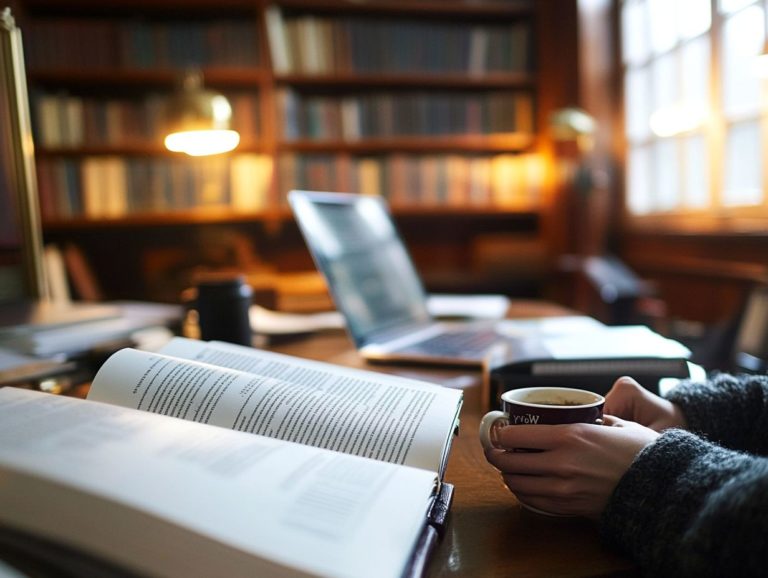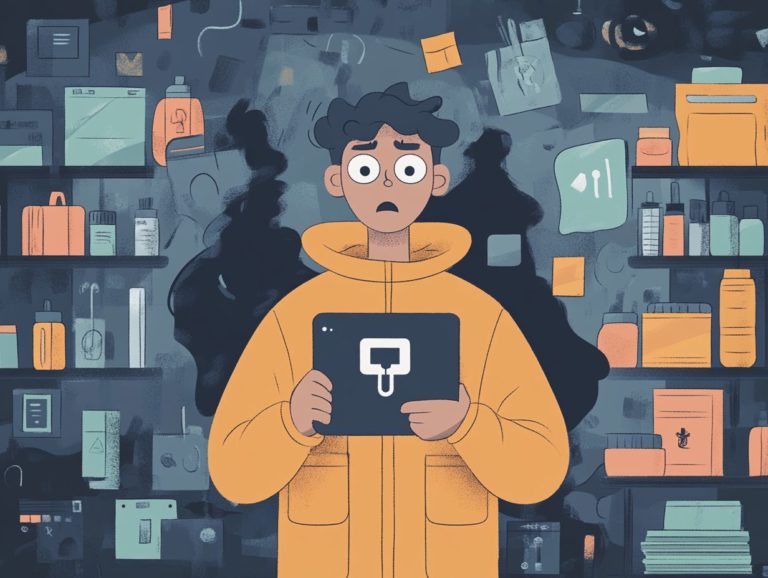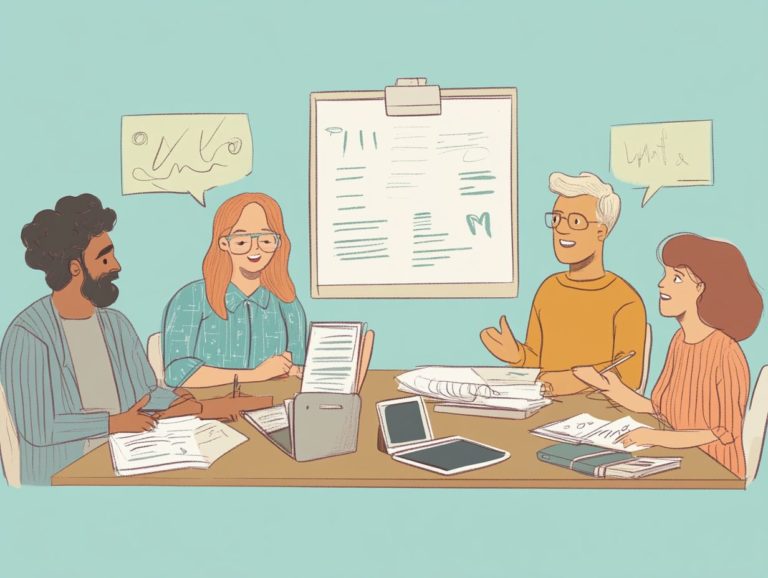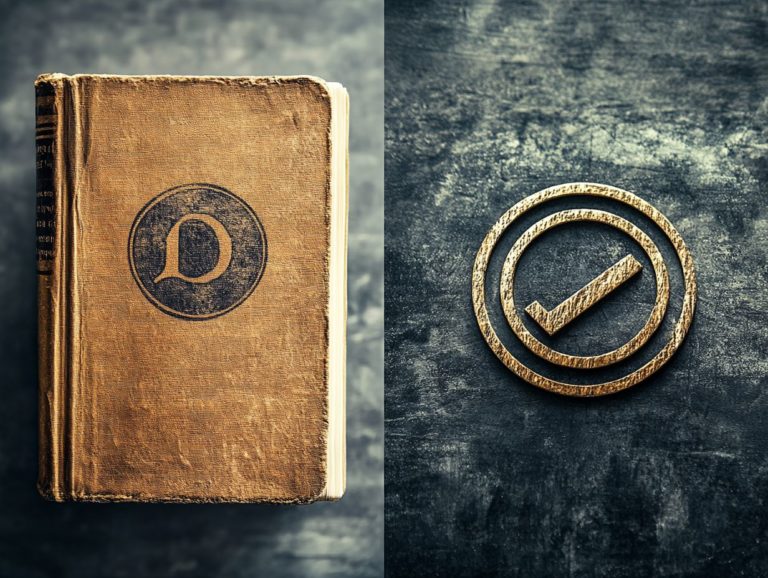5 Essential Copyright Questions Answered
Copyright serves as a vital shield for creative endeavors, helping artists, writers, and innovators protect their intellectual property with confidence.
In this article, you will uncover 15 essential questions that clarify the foundations of copyright. You’ll learn what it encompasses, how to secure it effectively, and the consequences that come with infringement.
Whether you re an aspiring creator or simply intrigued by copyright law, this guide provides valuable insights to help you navigate this important subject with assurance.
Contents
- Key Takeaways:
- 1. What Is Copyright and Why Is It Important?
- 2. What Does Copyright Protect?
- 3. How Can I Copyright My Work?
- 4. How Long Does Copyright Protection Last?
- 5. What Are the Penalties for Copyright Infringement?
- 6. Can I Use Copyrighted Material Without Permission?
- 7. What Is Fair Use and How Does It Apply to Copyright?
- 8. How Can I Protect My Copyrighted Work Online?
- 9. What Is the Difference Between Copyright and Trademark?
- 10. Can I Copyright an Idea?
- 11. How Can I Avoid Copyright Infringement?
- 12. What Are the Exceptions to Copyright Protection?
- 13. How Can I Defend My Copyright in Court?
- 14. What Are the International Copyright Laws?
- 15. How Can I Protect My Copyright When Working with Others?
- Frequently Asked Questions
Key Takeaways:
- Understand the definition and importance of copyright in protecting your original creative work.
- Know what is covered under copyright protection and how to register your work.
- Be aware of the potential penalties for copyright infringement and how to avoid them.
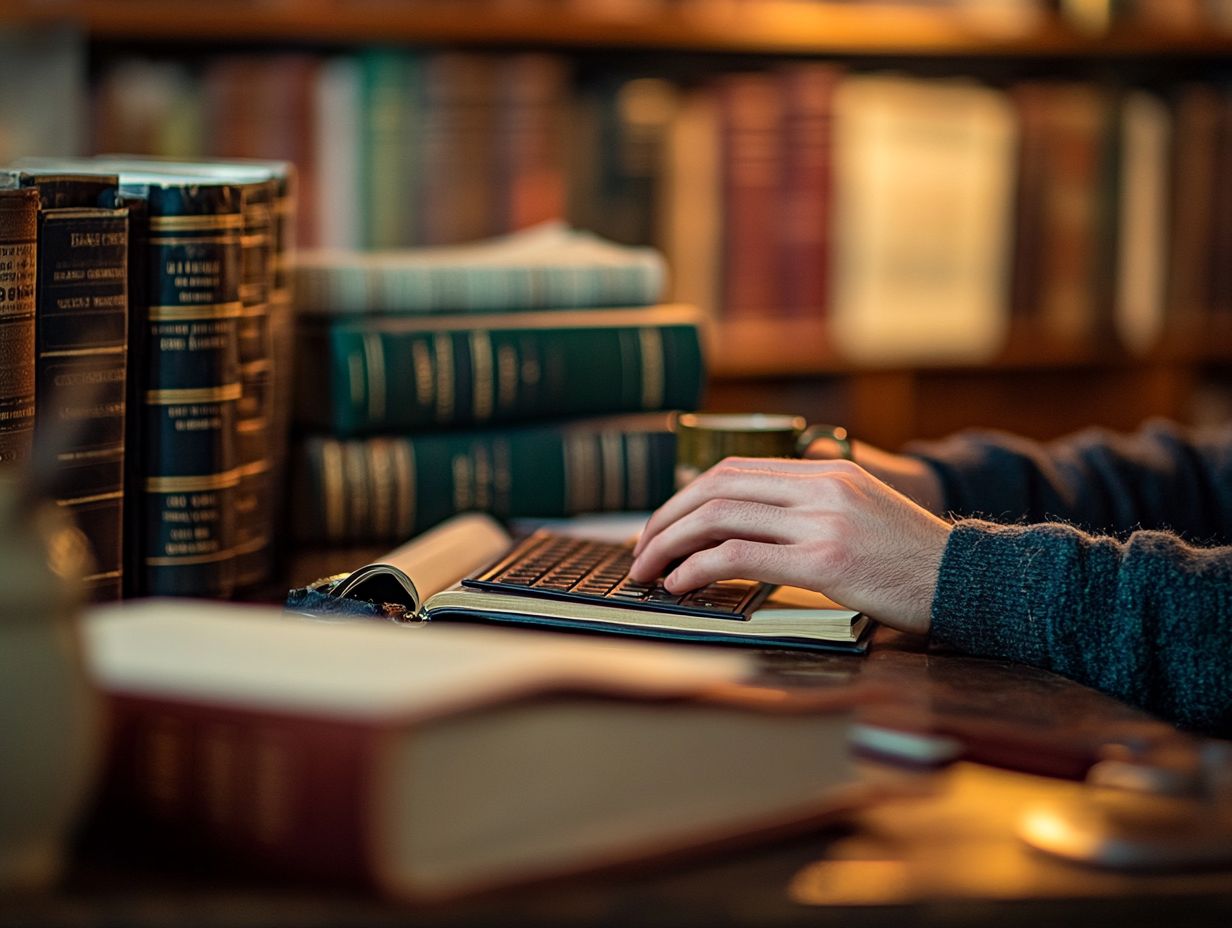
1. What Is Copyright and Why Is It Important?
Copyright is an essential part of intellectual property law that grants you exclusive rights to your original works. This framework nurtures an environment where your creative expression can thrive, while protecting your interests and ensuring adherence to copyright rules.
It acts as a shield for your artistic and literary creations, allowing you to maintain control over how your work is utilized and distributed. By conferring exclusive rights, copyright law motivates you to produce new works and enriches the cultural tapestry around you.
Think about it: popular songs, novels, and films are all safeguarded under copyright, guaranteeing that their creators like you receive both recognition and financial rewards.
The U.S. Copyright Office is instrumental in this process, offering a clear path for you to register your works and formally secure your rights. This adds an invaluable layer of protection against any unauthorized use of your creations.
2. What Does Copyright Protect?
Copyright shields a wide range of creative works, including artistic creations, literary masterpieces, and sound recordings. This protection grants you exclusive rights to your original creations, ensuring that your efforts are legally safeguarded against unauthorized use.
This law protects various artistic expressions like novels, poems, and music. Each category carries its own nuances; for instance, while a song s melody and lyrics are distinct elements deserving of copyright, a painting s visual composition is also independently protected.
To qualify for copyright protection, your work must be fixed in a tangible medium. This means it should be captured in a form that’s observable, whether it’s printed on paper, recorded as a digital file, or etched onto a canvas.
Understanding how copyright connects to tangible works is crucial for protecting your rights as a creator, and you can find valuable insights in these essential copyright tips for new authors!
3. How Can I Copyright My Work?
To copyright your work, you need to submit a copyright application to the U.S. Copyright Office. This is where your original authorship gets the recognition it deserves, providing you with legal protection and the perks of registered copyright status.
Start by determining the right form based on the type of work you want to protect, whether it s a literary piece, a musical composition, or a visual art creation. Accurately fill out the application, making sure every required section is complete. Don t forget to specify crucial details like the title of your work and the date it was created.
Payment of the application fee is also crucial, typically ranging from $45 to $65, depending on how you choose to submit your application. It’s essential to include a copy of your work for reference.
Don t wait! Register your work now to secure your rights and protect your creative efforts! Registering your copyright not only enhances your legal rights but also serves as vital evidence if any infringement issues arise. This registration can significantly strengthen your ability to enforce your rights and seek damages if necessary.
4. How Long Does Copyright Protection Last?
The duration of copyright protection varies based on the type of work and whether it has been registered. It typically lasts for the life of the copyright owner plus a few additional years as defined by copyright law.
For individual creators like you, this usually lasts 70 years after you pass away. In contrast, works created for hire often enjoy a shorter window 95 years from publication or 120 years from creation, whichever comes first.
Registration is vital for safeguarding your rights; it makes you eligible for statutory damages (this means you could receive a set amount of money if copyright is breached) and attorney’s fees should litigation arise. For those navigating these complexities, it’s helpful to refer to common questions about intellectual property. Recent shifts in copyright law haven’t dramatically altered these terms but highlight the importance of staying vigilant.
Understanding how your work is classified and being aware of any potential changes in duration is essential. Statutory damages can act as a crucial deterrent against unauthorized use, reinforcing the necessity of establishing and maintaining your copyright.
5. What Are the Penalties for Copyright Infringement?
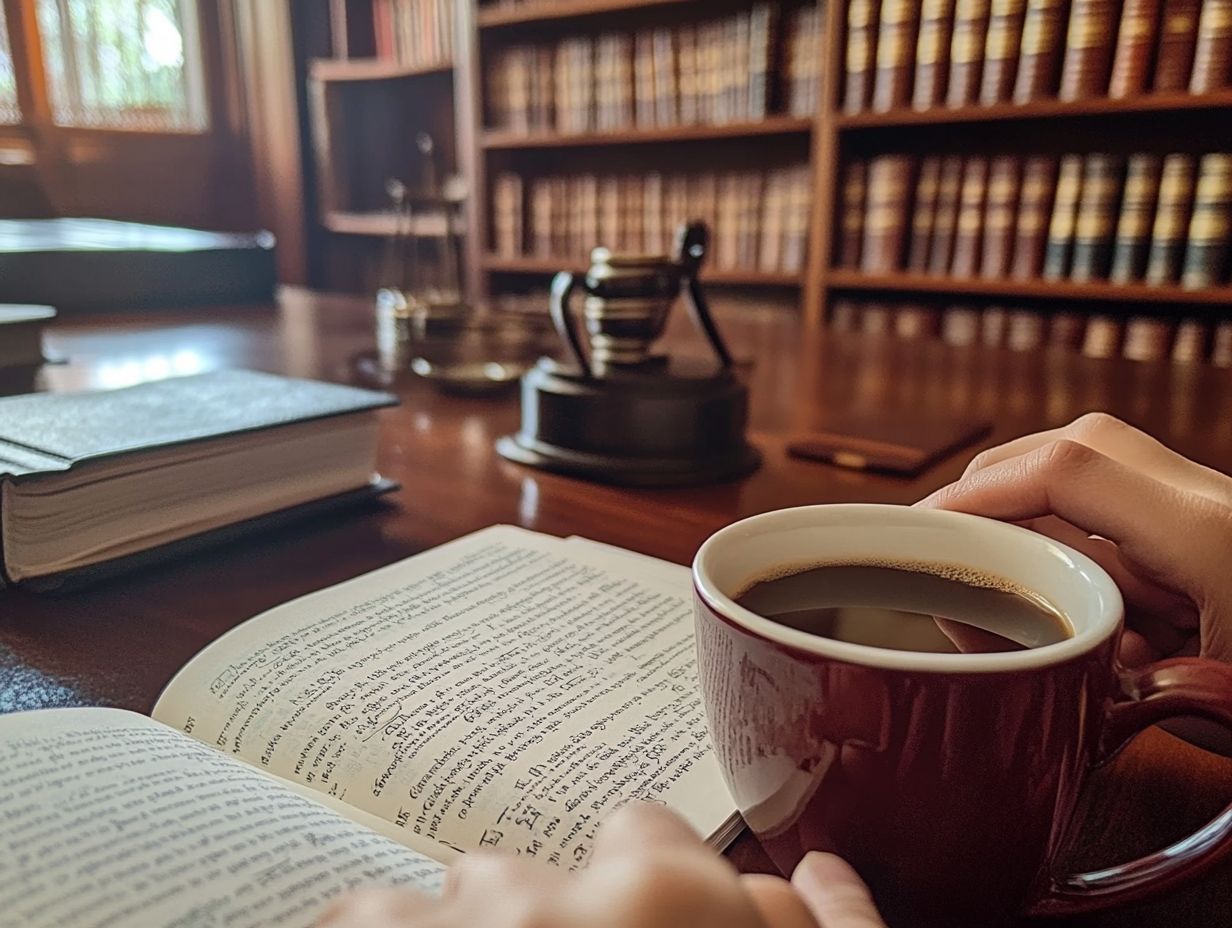
Penalties for copyright infringement can be quite severe, ranging from hefty statutory damages to legal actions taken in federal court. These measures primarily serve to protect the rights of copyright owners against unauthorized reproductions of their works.
Infringement cases can lead to a range of repercussions, including both civil and criminal penalties, which emphasize the importance of respecting intellectual property.
For example, if a company is found guilty of reproducing a well-known film without permission, it could face large fines, possibly amounting to millions. Injunctions can stop any more unauthorized distribution, as demonstrated in landmark cases like “Sony Corp. v. Universal City Studios,” where the judiciary firmly upheld copyright protections.
Ultimately, these implications serve as a vital reminder of the legal complexities surrounding copyright ownership, highlighting the importance of understanding licensing agreement FAQs.
6. Can I Use Copyrighted Material Without Permission?
Using copyrighted material without permission can land you in hot water for copyright infringement unless you can defend it under specific exceptions like fair use, particularly in educational or critical contexts.
Fair use is an exciting legal tool that lets you use some copyrighted material without seeking permission from the rights holders, primarily to foster freedom of expression and creativity.
When courts assess whether a particular use qualifies as fair, they typically consider several factors:
- The purpose of the use: Is it educational, non-profit, or commercial?
- The nature of the copyrighted work: Is it creative or factual?
- The proportion used: How much are you using compared to the whole?
- Market impact: Does your use affect the original work’s market?
For example, a teacher copying a brief excerpt from a book for classroom discussion often falls under fair use. Likewise, a film critic can highlight snippets of a movie in a review without breaching copyright, provided the usage stays within the fair use parameters.
7. What Is Fair Use and How Does It Apply to Copyright?
Fair use is an exciting legal tool that lets you use copyrighted material without obtaining permission from the copyright owner, especially for purposes like commentary, criticism, news reporting, and education. It s all about navigating the intricate boundaries of copyright infringement.
When assessing fair use, courts consider four key factors. First, they look at the purpose and character of your use transformative uses that add something new often lean in favor of fair use. Take, for example, a parody that reinterprets a song; that could easily qualify under this factor.
Next, the nature of the original work comes into play factual works tend to be more favorable than their creative counterparts. Then there s the third factor, which examines the amount and substantiality of what you’re using. Using just a small portion can bolster your fair use claim.
Finally, the effect of your use on the market for the original work is crucial; if your use doesn t diminish its market value, it s more likely to be considered fair. Successful defenses, like in *Campbell v. Acuff-Rose Music, Inc.*, showcase these principles effectively, illustrating the delicate balance between protecting creators and promoting free expression.
8. How Can I Protect My Copyrighted Work Online?
To safeguard your copyrighted work online, prioritize using copyright notices and tools to protect your work. Regularly check for unauthorized copies.
Apply watermarks to your images and videos. They serve as a visible reminder of your ownership and can deter potential infringers.
Monitoring online platforms for unauthorized use is essential for maintaining the integrity of your work. Automated tools can help detect misuse across various websites and social media platforms.
Take prompt action against copyright infringement to uphold your rights and promote a culture of respect for original creations.
9. What Is the Difference Between Copyright and Trademark?
Copyright and trademark are essential forms of intellectual property with distinct purposes. Copyright protects creative works, while trademarks safeguard brand names and logos, each conferring unique ownership rights.
Understanding the differences between these protections is vital for creators and business owners looking to secure their assets in today’s competitive landscape.
Copyright covers literary works, music, and visual arts, granting you exclusive rights to reproduce and distribute your creations. Trademarks, however, focus on branding, helping consumers identify the source of goods or services through distinctive names, symbols, or slogans.
This differentiation is crucial for maintaining market integrity and can greatly influence your reputation and the value of your business.
10. Can I Copyright an Idea?
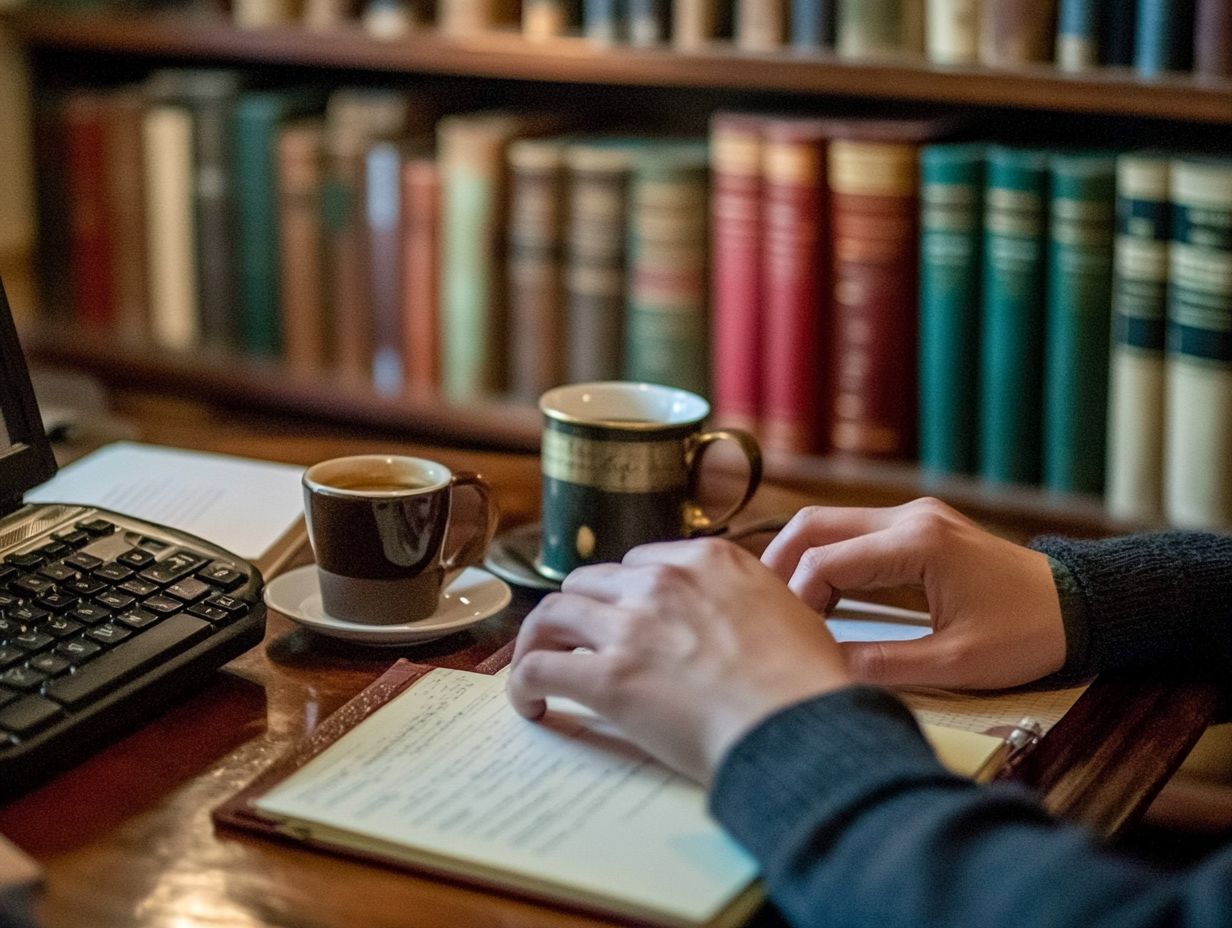
Under copyright law, you cannot copyright ideas themselves. However, the specific expression of those ideas once fixed in a tangible medium is eligible for copyright protection. This distinction separates the concept from the creative work.
While you cannot claim ownership over a general notion, you can assert rights over your unique presentation of that concept. For instance, if you craft a storyline about a heroic journey, others can explore the same theme, but your specific characters, dialogue, and narrative structure are protected.
Consider a song: its melody and lyrics can be copyrighted, but the idea of ‘love’ as a theme remains open for interpretation by countless artists.
This framework highlights how vital your unique ideas are, ensuring that your creativity is rewarded and your distinct artistic expressions are safeguarded.
11. How Can I Avoid Copyright Infringement?
Avoiding copyright infringement requires understanding ownership rights and navigating fair use provisions. To enhance your knowledge, consider exploring resources for learning about copyright law to ensure your use of others’ works is legitimate.
To safeguard yourself against unintentional breaches, source your material diligently. Check the licensing agreements of any content you wish to use to clarify how it can be utilized.
Credit original creators whenever possible. This fosters transparency and shows respect for their work. Staying informed about fair use allowing limited use of copyrighted material without permission under certain conditions can be especially advantageous for educators and content creators.
When in doubt, consult a legal expert for guidance on specific copyright questions, and consider referring to 5 essential resources for copyright owners to ensure that your creative endeavors remain protected and compliant.
12. What Are the Exceptions to Copyright Protection?
Copyright law provides several exceptions to copyright protection, including fair use and works in the public domain. These exceptions allow you to use certain materials without infringing on the rights of copyright owners.
Understanding these exceptions is crucial for both creators and educators. For example, fair use enables you to use copyrighted material for criticism, comment, news reporting, teaching, and scholarship. However, it s often assessed on a case-by-case basis.
Educational institutions frequently take advantage of this exception. They incorporate snippets of published works into their curricula to promote learning while respecting copyright.
Works that have entered the public domain such as classic literature and certain historical texts offer a wealth of resources that you can access and adapt freely. This enriches both cultural and academic landscapes.
13. How Can I Defend My Copyright in Court?
Defending your copyright in court requires understanding copyright infringement laws and having legal proof of your ownership. Often, it s advisable to seek the expertise of legal counsel to navigate these complexities effectively.
The process begins with carefully collecting proof that supports your ownership and demonstrates the infringement clearly. You must know the legal frameworks that govern copyright to protect your work!
Familiarize yourself with important agreements like the Berne Convention and the DMCA, as these are pivotal in establishing the legitimacy of your claim.
Additionally, consider potential outcomes damages, injunctions, or settlements that can shape your strategy significantly. Engaging experienced legal counsel is essential, as they provide tailored guidance and ensure that all procedural requirements are followed precisely.
14. What Are the International Copyright Laws?
International copyright laws, primarily governed by treaties such as the Berne Convention, create a framework for copyright protection across borders. This ensures that your rights as a creator are respected worldwide.
This alignment is essential for safeguarding the interests of artists, musicians, writers, and other creators who want to distribute their work internationally. The Berne Convention mandates that member countries recognize and uphold copyright from the moment a work is created.
Other international treaties, like the TRIPS Agreement, enhance these protections, although enforcement may vary between nations.
Are you aware of how different copyright laws can affect your work? Discrepancies in copyright laws can complicate matters for copyright owners, as local regulations may influence how their work is utilized or shared. Understanding copyrights: key concepts is important for effectively managing your intellectual property rights.
15. How Can I Protect My Copyright When Working with Others?
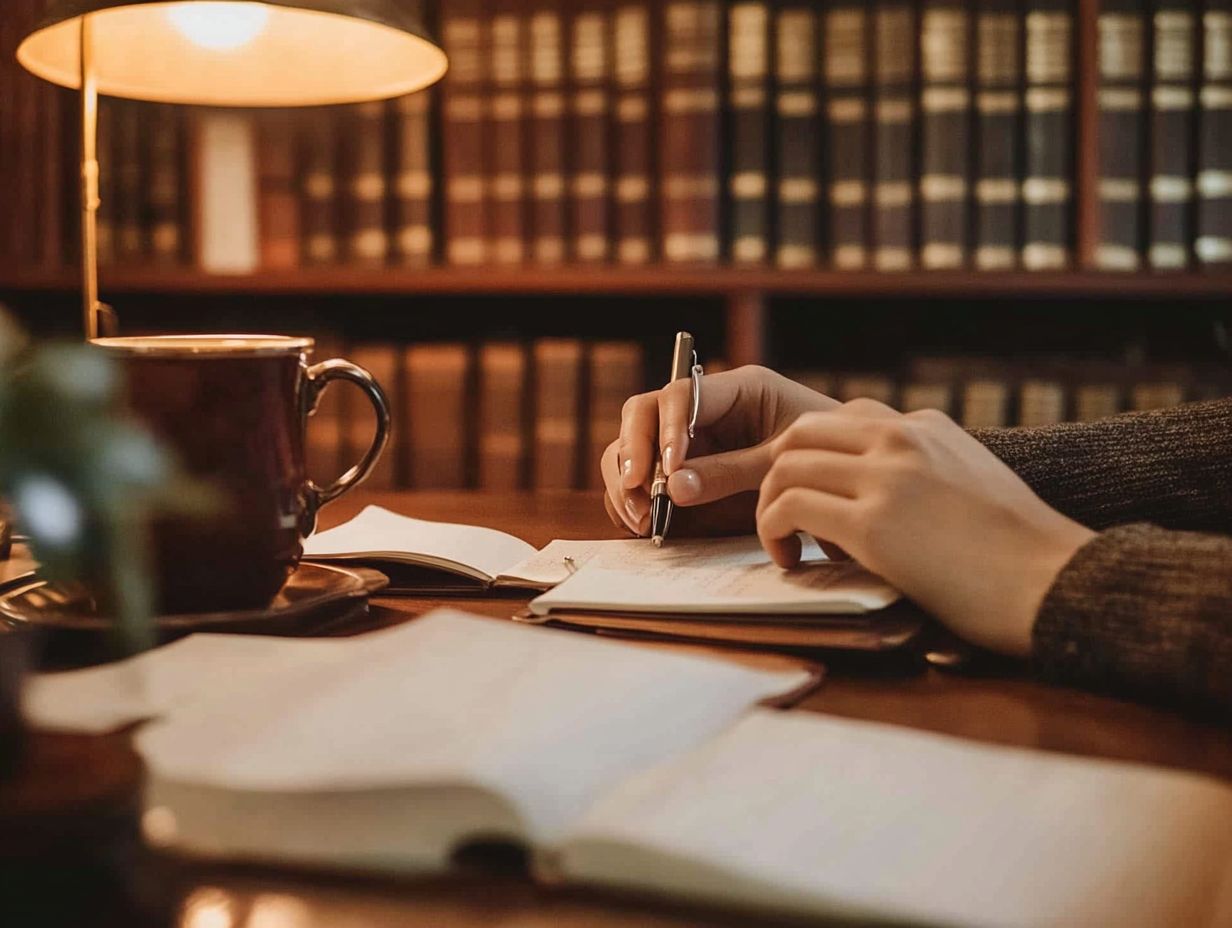
When you collaborate on creative projects, it s vital to establish clear agreements that protect copyright ownership. These agreements should outline how original works and creative expressions will be managed and attributed.
Such agreements foster trust among collaborators and provide a roadmap to navigate the complex landscape of intellectual property.
Draft contracts that detail profit distribution, clearly defining how earnings from the project will be shared among contributors. Include clauses regarding rights to derivative works new creations based on existing works to prevent future conflicts.
During negotiations, maintain open communication to ensure that all parties feel heard and understood.
To safeguard your creative assets, consider consulting legal experts specializing in intellectual property, ensuring that every agreement is thorough and legally enforceable.
Frequently Asked Questions
What is copyright and why is it important?
Copyright is a legal concept that grants creators the exclusive right to use and distribute their original work. It protects the intellectual property and creative rights of creators, ensuring they receive recognition and compensation for their work.
What is copyright?
Copyright is a law that protects your creative work from being used without permission. It covers original works like books, music, art, software, and films.
How can I obtain copyright protection for my work?
Your work is automatically protected by copyright as soon as it s created and saved in a form that can be seen or heard. It’s smart to register your work with the Copyright Office for added protection and proof of ownership.
What are the limitations of copyright protection?
Copyright does not protect ideas, facts, or common knowledge. It typically lasts for the life of the creator plus 70 years after their death.
Can I use copyrighted material without permission?
Always ask the copyright holder for permission before using their work. Fair use allows you to use a small portion of copyrighted material for purposes like criticism, teaching, or research.
What are the consequences of copyright infringement?
Copyright infringement happens when someone uses copyrighted material without permission. Consequences can include legal action, fines, and other damages, depending on the situation.

